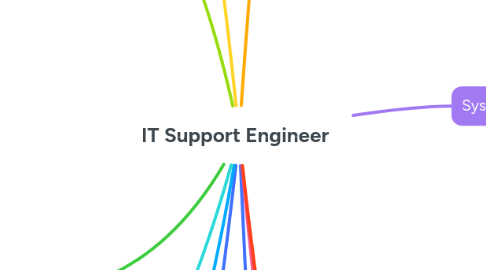IT Support Engineer
da Ruth Levina


1. Cyber security measures
2. Industry-standard governance & best practices
3. SharePoint document management
4. Professional development
4.1. Apple Certified Systems Administrator
4.2. CompTIA A+ 2019 certification
4.3. HDI Technical Support Professional
4.4. ITIL Foundation Certification
4.5. Microsoft Certifications (MCSA)
4.6. Cisco CCENT certifications
5. Technical knowledge
5.1. Network security
5.2. Broad knowledge of virtual environments
5.3. Specific enterprise software
5.4. VPN technology and redundancy, other security measures
5.5. SQL
5.6. CRMs
5.7. Understanding source code
5.8. Writing commands and workflow processes
5.9. Different types of applications (Web, PET, etc.)
5.10. Enterprise hardware expertise
6. Interacting with customers
6.1. Forums or Masterclass sessions
6.2. Active listening & written communication
7. Scripting Languages
7.1. Python/ JavaScript /PHP / Ruby/ Perl/ C++/ Golang/ Groovy/ Bash
8. System Monitoring
8.1. NinjaOne (Formerly NinjaRMM)
8.2. SolarWinds Server and Application Monitor
8.3. Atera
8.4. eG Innovations
8.5. Datadog
8.6. Site24x7
8.7. Sematext
8.8. ManageEngine OpManager
8.9. ManageEngine RMM
8.10. PRTG Network Monitor
8.11. Zabbix
8.12. Spiceworks Network Monitor
8.13. Nagios
8.14. WhatsUp Gold
8.15. Cacti
8.16. Icinga
8.17. OpenNMS
9. Troubleshooting
9.1. Diagnosis
9.1.1. Resolution
9.1.1.1. Escalation
10. Installing & Configuring
10.1. Computer hardware
10.2. Software systems
10.2.1. Windows, Linux, or Mac OS.
10.3. Networks
10.3.1. LAN/ WAN/ MAN
10.4. Printers
10.5. Scanners
11. Service Desk Tools
11.1. Problem Resolution
11.1.1. Virtualbox
11.1.2. Ultimate Bootcd
11.1.3. Gedit Or Notepad++
11.1.4. Bugzilla
11.1.5. Osticket
11.1.6. Uservoice
11.1.7. Microsoft Rdcman
11.1.8. Evernote Or Microsoft Onenote
11.1.9. Wiki
11.1.10. Terminals
